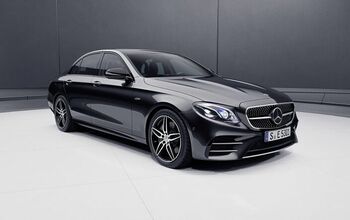Mercedes-Benz Announces Electric G-Class

Sascha Pallenberg, Daimler’s Head of “Digital Transformation,” shared a quote from CEO Ola Källenius issued at this year’s Automobilwoche Kongress, saying Mercedes-Benz is planning to manufacture an electric G-Class.
“There will be a zero-emission EV version of the Mercedes-Benz G-Class. In the past there were discussions whether we should eliminate the model, the way I see things now I’d say the last Mercedes to be built will be a G-Class,” Källenius said.
Using current battery technologies, this seems idiotic. The G-Class already outweighs pretty much every EV on the market this author can think of and it’s only going to get heavier once it’s lugging around a gigantic battery pack. The lightest G-Wagon tips the scales at 5,550 pounds. Another thousand wouldn’t be out of the question if Daimler expects it to have a truly competitive range. The model is just too heavy and has the aerodynamics of an open parachute.
But that doesn’t mean it won’t happen. The G’s clientele often have more money than sense and zero-emission vehicles are pretty in with the Hollywood crowd these days. Maybe this will become the next Toyota Prius. Just don’t point out that a three-ton electric isn’t likely to be the most energy-efficient vehicle unless you’re ready for an argument with someone above your pay grade.
However, that presumes the GE-Class… EQG-Wagen (?) … whatever they call it, will be a production vehicle. We could just as easily see Mercedes using it as a way to showcase MB’s newest technologies at trade events. Alternatively, the manufacturer could make it hydrogen powered and sell it in isolated areas as a compliance model. Källenius never specified anything other than it being a zero-emission vehicle.
Due to the preliminary nature of this announcement, we figure the EV is likely in the very earliest stages of development. Don’t expect to see an electric G-Class ready for purchase for at least a couple of years. Also, don’t assume Mercedes-Benz will take an axe to the gas-powered version. Going all-electric (or hydrogen) is a huge gamble for the model, and Daimler will want to hedge its bets.
CEO Källenius: ”There will be a zero-emission version of the G-Class. In the past there were discussions whether we should eliminate the model, the way I see things now I'd say the last Mercedes to be built will be a G-Class" pic.twitter.com/tAS6tzpR3Y
— Sascha Pallenberg 潘賞世 (@sascha_p) November 7, 2019
[Image: Daimler AG]

A staunch consumer advocate tracking industry trends and regulation. Before joining TTAC, Matt spent a decade working for marketing and research firms based in NYC. Clients included several of the world’s largest automakers, global tire brands, and aftermarket part suppliers. Dissatisfied with the corporate world and resentful of having to wear suits everyday, he pivoted to writing about cars. Since then, that man has become an ardent supporter of the right-to-repair movement, been interviewed on the auto industry by national radio broadcasts, driven more rental cars than anyone ever should, participated in amateur rallying events, and received the requisite minimum training as sanctioned by the SCCA. Handy with a wrench, Matt grew up surrounded by Detroit auto workers and managed to get a pizza delivery job before he was legally eligible. He later found himself driving box trucks through Manhattan, guaranteeing future sympathy for actual truckers. He continues to conduct research pertaining to the automotive sector as an independent contractor and has since moved back to his native Michigan, closer to where the cars are born. A contrarian, Matt claims to prefer understeer — stating that front and all-wheel drive vehicles cater best to his driving style.
More by Matt Posky
Latest Car Reviews
Read moreLatest Product Reviews
Read moreRecent Comments
- W Conrad I'm not afraid of them, but they aren't needed for everyone or everywhere. Long haul and highway driving sure, but in the city, nope.
- Jalop1991 In a manner similar to PHEV being the correct answer, I declare RPVs to be the correct answer here.We're doing it with certain aircraft; why not with cars on the ground, using hardware and tools like Telsa's "FSD" or GM's "SuperCruise" as the base?Take the local Uber driver out of the car, and put him in a professional centralized environment from where he drives me around. The system and the individual car can have awareness as well as gates, but he's responsible for the driving.Put the tech into my car, and let me buy it as needed. I need someone else to drive me home; hit the button and voila, I've hired a driver for the moment. I don't want to drive 11 hours to my vacation spot; hire the remote pilot for that. When I get there, I have my car and he's still at his normal location, piloting cars for other people.The system would allow for driver rest period, like what's required for truckers, so I might end up with multiple people driving me to the coast. I don't care. And they don't have to be physically with me, therefore they can be way cheaper.Charge taxi-type per-mile rates. For long drives, offer per-trip rates. Offer subscriptions, including miles/hours. Whatever.(And for grins, dress the remote pilots all as Johnnie.)Start this out with big rigs. Take the trucker away from the long haul driving, and let him be there for emergencies and the short haul parts of the trip.And in a manner similar to PHEVs being discredited, I fully expect to be razzed for this brilliant idea (not unlike how Alan Kay wasn't recognized until many many years later for his Dynabook vision).
- B-BodyBuick84 Not afraid of AV's as I highly doubt they will ever be %100 viable for our roads. Stop-and-go downtown city or rush hour highway traffic? I can see that, but otherwise there's simply too many variables. Bad weather conditions, faded road lines or markings, reflective surfaces with glare, etc. There's also the issue of cultural norms. About a decade ago there was actually an online test called 'The Morality Machine' one could do online where you were in control of an AV and choose what action to take when a crash was inevitable. I think something like 2.5 million people across the world participated? For example, do you hit and most likely kill the elderly couple strolling across the crosswalk or crash the vehicle into a cement barrier and almost certainly cause the death of the vehicle occupants? What if it's a parent and child? In N. America 98% of people choose to hit the elderly couple and save themselves while in Asia, the exact opposite happened where 98% choose to hit the parent and child. Why? Cultural differences. Asia puts a lot of emphasis on respecting their elderly while N. America has a culture of 'save/ protect the children'. Are these AV's going to respect that culture? Is a VW Jetta or Buick Envision AV going to have different programming depending on whether it's sold in Canada or Taiwan? how's that going to effect legislation and legal battles when a crash inevitibly does happen? These are the true barriers to mass AV adoption, and in the 10 years since that test came out, there has been zero answers or progress on this matter. So no, I'm not afraid of AV's simply because with the exception of a few specific situations, most avenues are going to prove to be a dead-end for automakers.
- Mike Bradley Autonomous cars were developed in Silicon Valley. For new products there, the standard business plan is to put a barely-functioning product on the market right away and wait for the early-adopter customers to find the flaws. That's exactly what's happened. Detroit's plan is pretty much the opposite, but Detroit isn't developing this product. That's why dealers, for instance, haven't been trained in the cars.
- Dartman https://apnews.com/article/artificial-intelligence-fighter-jets-air-force-6a1100c96a73ca9b7f41cbd6a2753fdaAutonomous/Ai is here now. The question is implementation and acceptance.


































Comments
Join the conversation
It bothers me no end that it's considered ok to call EVs 'zero-emission'. That's 100% a straight-up lie. This one is not only clearly not 'zero-emission', but how much will it weigh, 3 tons?
You're missing the point; there are a few city centers in the world where non-hybrid cars are banned from entering, and those city centers happen to be places where you go to be seen. The G-Wagen clientele cannot be seen without their rig, so an electric G would allow them to cruise right on in with a side bonus of virtue signaling.